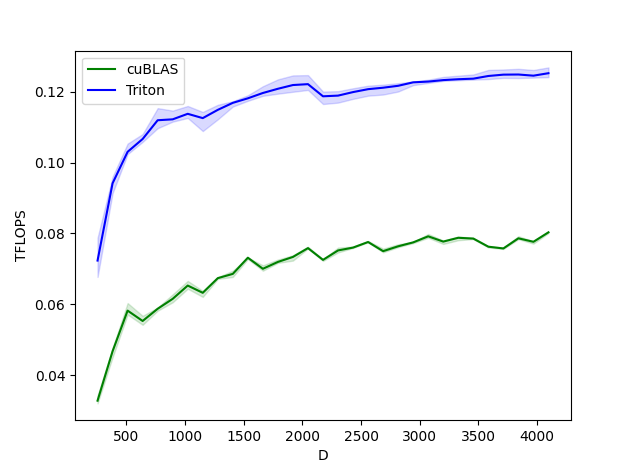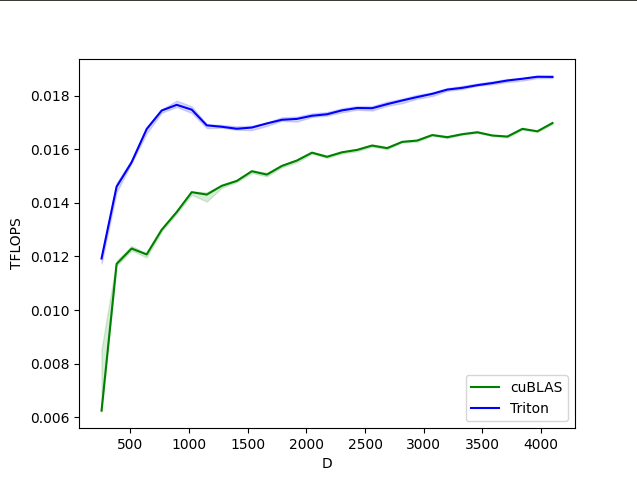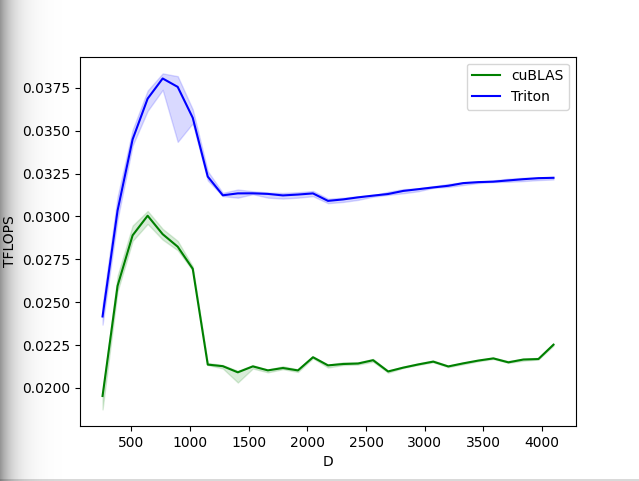Implementation of a Transformer, but completely in Triton. I'm completely new to lower-level neural net code, so this repository will mostly be a learning experience, with the end-goal being a vanilla transformer that is faster and more efficient to train.
Layernorm forward
Layernorm forwards and backwards
Softmax forwards and backwards
$ pip install triton-transformerimport torch
from triton_transformer import Transformer
model = Transformer(
num_tokens = 256, # vocab size
max_seq_len = 1024, # maximum sequence length
dim = 512, # dimension
depth = 6, # depth
heads = 8, # number of heads
dim_head = 64, # dimension per head
causal = True, # autoregressive or not
attn_dropout = 0.1, # attention dropout
ff_dropout = 0.1, # feedforward dropout
use_triton = True # use this to turn on / off triton
).cuda()
x = torch.randint(0, 256, (1, 1024)).cuda()
logits = model(x) # (1, 1024, 256)To train, just pass in the labels with the keyword labels on forward, and the cross entropy loss will be returned for backprop.
ex. BERT
import torch
from triton_transformer import Transformer
model = Transformer(
num_tokens = 20000,
max_seq_len = 512,
dim = 512,
depth = 12,
heads = 8,
dim_head = 64,
use_triton = True
).cuda()
x = torch.randint(0, 20000, (1, 512)).cuda()
labels = torch.randint(0, 20000, (1, 512)).cuda()
mask = torch.ones(1, 512).bool().cuda()
loss = model(x, mask = mask, labels = labels)
loss.backward()$ python train.py- softmax
- cross-entropy (using triton ops)
- layernorm forward
- layernorm backwards
- batch matrix multiply + fused act forwards
- optimize layernorm backwards (figure out how much to store vs recompute)
- use memory efficient dropout from Triton tutorials
- batch matrix multiply + fused act backwards
- fused attention (expand on softmax)
- use triton matmul for other projections
- benchmark and optimize
- kernels conditional on inference vs training
- efficient triangular matmul kernel for causal attention
@article{Tillet2019TritonAI,
title = {Triton: an intermediate language and compiler for tiled neural network computations},
author = {Philippe Tillet and H. Kung and D. Cox},
journal = {Proceedings of the 3rd ACM SIGPLAN International Workshop on Machine Learning and Programming Languages},
year = {2019}
}@misc{vaswani2017attention,
title = {Attention Is All You Need},
author = {Ashish Vaswani and Noam Shazeer and Niki Parmar and Jakob Uszkoreit and Llion Jones and Aidan N. Gomez and Lukasz Kaiser and Illia Polosukhin},
year = {2017},
eprint = {1706.03762},
archivePrefix = {arXiv},
primaryClass = {cs.CL}
}@misc{so2021primer,
title = {Primer: Searching for Efficient Transformers for Language Modeling},
author = {David R. So and Wojciech Mańke and Hanxiao Liu and Zihang Dai and Noam Shazeer and Quoc V. Le},
year = {2021},
eprint = {2109.08668},
archivePrefix = {arXiv},
primaryClass = {cs.LG}
}@article{chowdhery2022PaLM,
title = {PaLM: Scaling Language Modeling with Pathways},
author = {Chowdhery, Aakanksha et al},
year = {2022}
}

